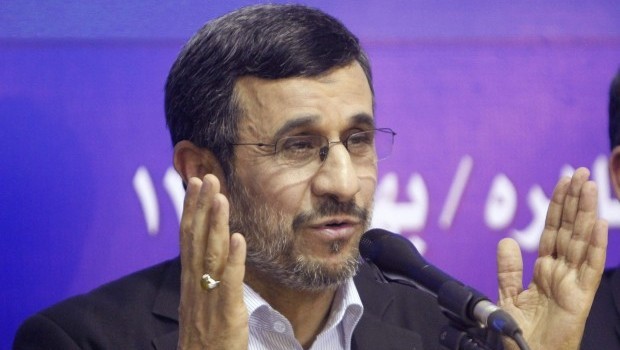
Iran’s President Mahmoud Ahmadinejad talks during a news conference at the end of his visit to Cairo, February 7, 2013. (REUTERS/Asmaa Waguih)
Cairo, Asharq Al-Awsat—Iranian President Mahmoud Ahmadinejad spoke to Asharq Al-Awsat on the sidelines of a diplomatic function in Cairo that was also attended by Egyptian President Mohamed Mursi and a number of senior Egyptian politicians.
The Iranian President told Asharq Al-Awsat, “We love Egypt and want to establish strong strategic ties with the country” adding that future bilateral relations will be “firm and broad and clear for all to see.”
Ahmadinejad refused to be drawn about Tehran’s support for Bashar al-Assad or the worsening crisis in Syria. This was prior to the Iranian president escaping a failed attack—the second of his controversial visit to Egypt—at the same diplomatic function. This was held at the home of Iranian diplomat Mojtaba Amani on Thursday, reportedly to commemorate the anniversary of the Iranian Islamic Revolution.
Asharq Al-Awsat asked the Iranian president for his view of the proposals put forward by the regional states—particularly Saudi Arabia, Egypt, and Turkey—towards resolving the Syrian crisis. Ahmadinejad replied, “I am confident that our brothers in Saudi Arabia will be happy with any positive steps regarding the Syrian situation, and I do not see any evidence from them that they will not welcome this.”
Commenting on the historic relations between the Muslim Brotherhood in Egypt and the Iranian revolution, and how this has reflected on bilateral relations between Iran and post-Arab Spring Egypt, Ahmadinejad stressed, “Nobody can take away the bonds of affection between the two peoples, even in light of the presence of those who seek to ambush these relations to get rid of them and drive a wedge between us” adding, “We love Egypt.”
The Iranian President was also keen to clarify that he had exempted Egyptian tourists and traders from visa requirements to enter Iran in the hope that this will be reciprocated. He said that this program could be expanded to include scientists and academic, adding “the same applies to technical and technological cooperation with Egypt.”
Ahmadinejad had held a tense meeting with Al-Azhar Grand Sheikh Ahmed al-Tayeb last Wednesday. During this tense meeting, Egypt’s top Sunni cleric had scolded the Iranian president, calling on him not to meddle in Gulf Arab affairs and “respect Bahrain as a sisterly Arab state.” Commenting on this meeting, Ahmadinejad said, “We went there to achieve solidarity with our brothers, and we had a good discussion of the issues.”
He added, “It is self-evident, both in Iran and Egypt, that certain subjects or issues are raised by those with a narrow point of view . . . however we believe that we must agree on major objectives to achieve unity and solidarity, such as justice, peace and brotherhood . . . as well as in order to get rid of discrimination, tyranny, occupation and aggressions. Narrow-minded views only create more division. The devils want the believers (Muslims) to be preoccupied with small and narrow issues.”
He expressed his disappointment at being scolded by the Al-Azhar Grand Sheikh, saying “Our principles unite us, whereas these issues (mentioned by al-Tayeb) were political issues.” He added, “There are differences of opinion in every family. You cannot find two people who are exactly the same or who think in precisely the same way, and the same applies to the al-Azhar student body and professors.”
He added, “We will not be held prisoner or become a puppet in the hands of the enemy.”
Ahmadinejad also spoke about Iran’s refusal to negotiate with the US over the Iranian nuclear file, saying that Tehran refuses to negotiate while being pressured in this manner. He called on Washington to change its threat-based approach.
The Iranian president said, “If somebody threatened you with a cudgel to make you engage in dialogue, would you agree? Normally, the process of dialogue is based on mutual respect. If they (the Americans) correct their approach and discourse then everything will be fine.”
Despite affirming that Tehran does not interfere in the affairs of Bahrain, Ahmadinejad called on the Bahraini government to respect the will of the people. He said, “Freedom, justice, and respect are rights that belong to all peoples, and everybody has the right to elect their own governments, and Bahrain is not exempt from this.”
He added, “We have no involvement in Bahraini affairs, but we insist that the government must respect the rights of the Bahraini people.”
Following this interview, Iranian President Mahmoud Ahmadinejad was attacked for the second time during his first official trip to Egypt. This attack was all the more surprising in light of the heavy security presence. After a closed-door meeting with Egyptian politicians, including members of the National Salvation Front and the Muslim Brotherhood, Ahmadinejad was confronted by a man shouting pro-Syrian revolution slogans.
An Egyptian national, whose identity remains unknown, lunged towards the Iranian president shouting “Thugs, get out of our country.” Both Ahmadinejad and his attacker were immediately surrounded by security. As the Egyptian was dragged away, he reportedly shouted “Death to the butcher al-Assad” and “Death to Ahmadinejad.” He was handed over to Egyptian authorities.
This was the second time that Ahmadinejad has been attacked over the past week, with both attackers focusing on Tehran’s pro-Assad policy. A Syrian national had attempted to throw a shoe at the Iranian president as he left Cairo’s al-Hussein mosque following evening prayers on Wednesday. Footage shows a man striking out several times as Ahmadinejad is immediately surrounded by body-guards. The attacker reportedly denounced Ahmadinejad as a “coward” and was arrested following the incident.
